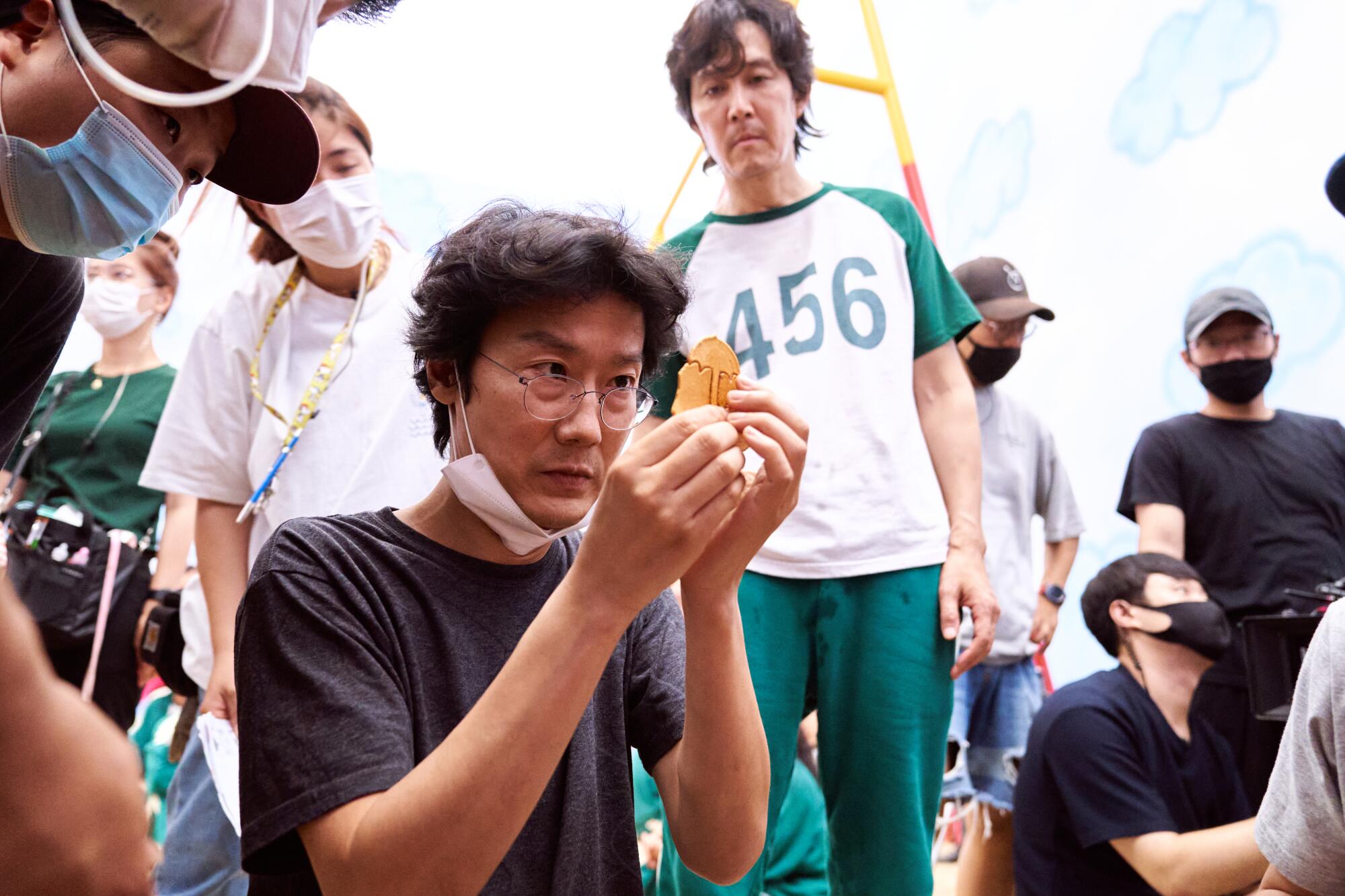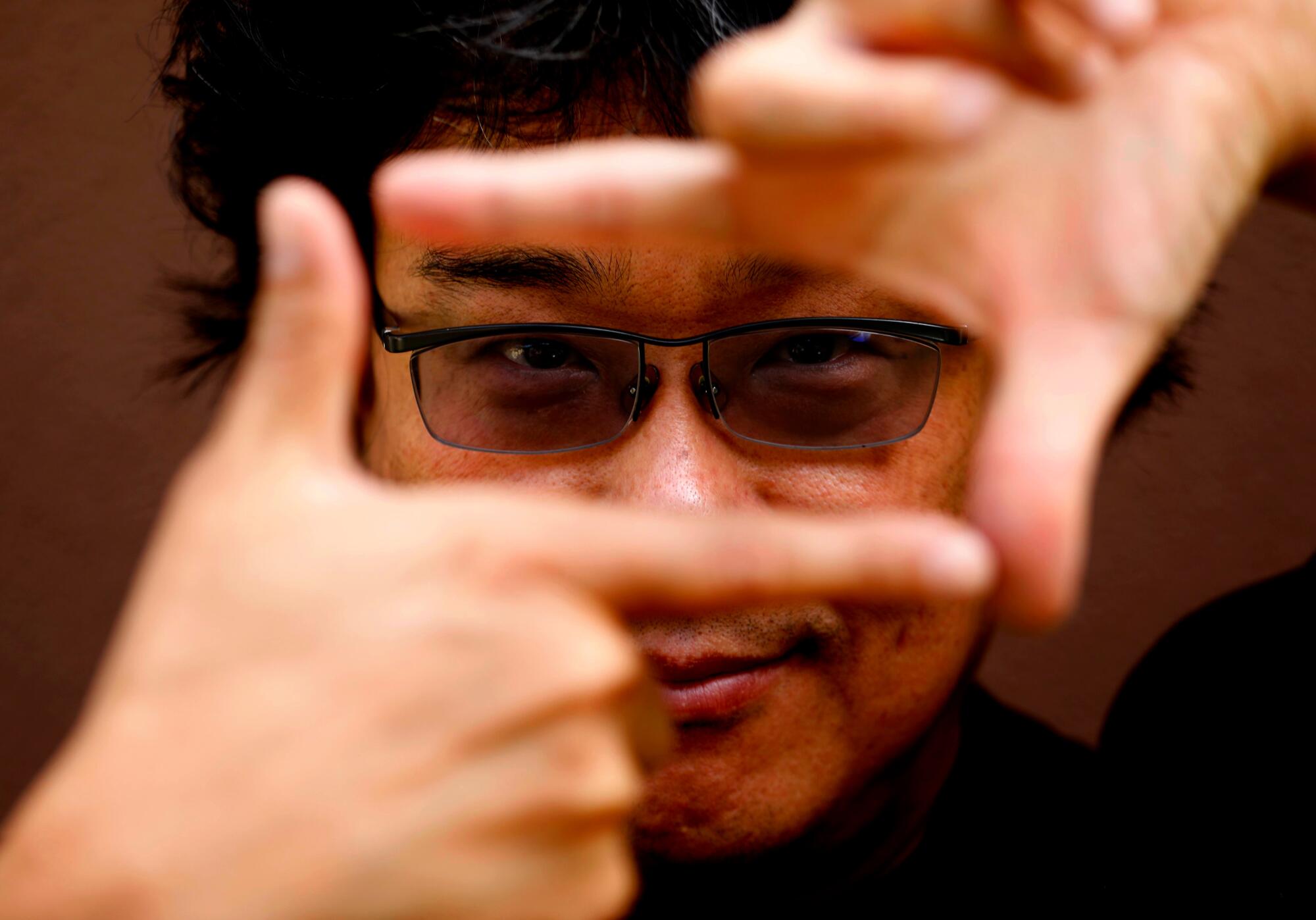
- Share via
On election day in 2008, Seung Bak and his business partner went to a Korean broadcaster’s outpost in Los Angeles with $50,000 of their savings, asking to license Korean television dramas to stream online.
They were met with quizzical stares. Who outside the Korean diaspora would watch Korean shows, much less pay for them? Would American TV viewers all of a sudden start reading subtitles? And what the heck even is streaming?
It would be several more years before Netflix’s own streaming business took off in earnest and “binge-watching” became a couch sport. It was well before — it is hard to even imagine now — BTS, “Parasite,” then “Squid Game” created a South Korean cultural output that captured the world’s imagination and redefined how entertainment transcends borders.
Bak and his fellow Korean American entrepreneur Suk Park, though, were already seeing a groundswell of demand for Korean content in the U.S. and across the English-speaking world. Fans were illegally downloading or streaming pirated shows, risking malware and enduring incessant pop-up ads. They were organizing among themselves to subtitle hours and hours of melodrama for the growing legions of non-Korean-speaking devotees.
Something about the shows incited a fervor, a thirst, that cut across language and culture and spread virally — at a time when “going viral” had not quite yet entered the lexicon.

“We were finding this raw demand that seemed to have existed organically,” said Bak, who co-created the streaming site DramaFever, later sold to SoftBank, then to Warner Bros. in 2016 for “a nine-figure sum.” The site sampled and experimented with content from around the world, from Bollywood to Turkey to Eastern Europe. But none seemed to resonate with users the way Korean shows did.
“How is it possible,” Bak said, “that this little country can create story lines that so many people want to consume?”
It happened with K-pop when fans eagerly raced down the rabbit hole of snazzily produced music videos and imitable dance moves on YouTube. It happened with films when “Parasite” won four Oscars and buzz started surrounding director Bong Joon Ho and other South Korean auteurs. It’s happening again with Korean scripted shows and melodramas following the global hit “Squid Game,” with streaming algorithms queuing up one South Korean production after another.
The popularity of “Squid Game” is inseparable from South Korea’s very real crisis of mounting household debt, gaping inequality and a weak social safety net.
The global moment South Korean cultural exports are enjoying is a confluence of social media and streaming services bringing down cultural borders and language barriers at a time when the nation’s creative industries were ambitiously poised to expand beyond a limited domestic market.
In 2020, South Korea logged a trade surplus in intellectual property rights relating to arts and culture for the first time, a trend that continued in 2021, according to the Bank of Korea.
“South Korea, because of this tradition of export-oriented industrialization, intensified after the [1997 Asian financial] crisis, really designed everything to be exported,” said John Lie, a UC Berkeley sociologist who has written extensively about K-pop. “It’s meant to have universal appeal.”
Behind each South Korean cultural phenomenon that’s swept the world in recent years is a unique set of intricate crosscurrents.
Train zombies. Historic zombies. High-rise apartment zombies. DMZ zombies. The undead are proliferating in South Korea’s imagination.
In K-pop, concerted efforts from music labels and talent agencies targeted overseas markets beginning in the early 2000s, recruiting Chinese, Japanese, Thai and Asian American trainees for girl and boy bands, and releasing songs in languages other than Korean. Another crucial driving force was the highly organized fan bases K-pop groups spawned that would stream a preferred artist’s new releases and videos as part of all-out social media blitzes to build hype around singles and albums.

The success of Korean movies came another way. Decades of protectionism that mandated Korean theaters devote a certain quota to domestically produced cinema merged with a robust film industry dating to the 1960s that flourished with the end of censorship. That set the stage for a generation led by cinephiles steeped in Hollywood influence. “Parasite” director Bong Joon Ho and filmmaker Kim Jee-woon have each cited the impact of watching films on AFKN, the American Forces Korea Network, broadcast for U.S. troops stationed in South Korea.
Korean television series first got a foothold in Japan, then in China, before exploding in popularity across Asia, giving rise to what’s been termed the “Korean wave.” Initially based on melodramatic story lines and Cinderella-esque tropes, the shows have matured in production quality, diversified in genres and strengthened in plot as the industry has become increasingly profitable and commanded more substantial budgets.
With the arrival of streaming services including Netflix, Korean scripted series have crossed over to Western audiences in a way that’s been surprising even to their creators.
‘You can’t tell whether it’s night or daytime,’ said a woman who lives in a semi-basement home featured in the Academy Award-winning ‘Parasite.’ ‘It’s a good place to dream.’
Particularly resonant across borders has been a long-running undercurrent of social critique among Korean filmmakers that’s bled into scripted shows, evinced in the less-than-subtle dark class commentary of “Parasite” and “Squid Game.” Former President Park Geun-hye, a conservative impeached in a corruption scandal in 2017, was so threatened by the influence of progressives in the arts that she and her aides kept a blacklist of thousands, including film directors and actors, whose funding, opportunities and careers were stymied.
“It has a very high ‘travelability’ factor that was underestimated in the beginning,” said Sarah Chung, a Korean drama devotee who estimates she’s watched several hundred South Korean shows. She’s made a career out of it, building the English-language recap site Dramabeans and creating fan content for Netflix in recent years. “They thought only the Korean diaspora liked it, and that wasn’t true; only the Asian diaspora would like it, and that wasn’t true. It kept defying expectations on how far it resonated.”
Chung said the shows’ appeal was that it invested audiences in characters over the course of a limited miniseries that promised a cathartic conclusion, rather than the drawn-out, seasons-based system established in the U.S.
“I think K-dramas, K-content, has somehow managed to put its finger on getting an emotional rise out of the viewer,” said Chung, who left Netflix at the end of December. “They push your buttons.”

Hyun Park, head of the global division for Studio Dragon, a production company behind some of the biggest Korean drama hits in recent years, said the recognition brought by the success of “Parasite” and “Squid Game” was opening up new horizons for the industry.
Until the arrival of Netflix and other streaming services — Apple TV+ and Disney+ launched in South Korea late last year, in addition to a handful of homegrown providers — Korean writers and directors were limited in subject matters and tied to broadcast schedules, he said.
“It’s a new chance for our creators to do everything they’ve wanted to.... There’s a lot of pent-up creativity finding ways to manifest,” said Park, who was also part of the early team at DramaFever. “We’re about to experience a renaissance of Korean dramas at a cinematic scale.”
Recent breakthrough moments surrounding Korean films, music or shows generated online conversations worldwide akin to buzz surrounding global events such as the World Cup or the Olympics, said Kim Yeon-jeong, Twitter’s head of K-pop and Korean content partnerships.
For novelist Steph Cha, K-pop band H.O.T. and action film “Shiri” are a few culture predecessors to this hallyu moment of global success for “Parasite” and BTS.
The latest is “All of Us Are Dead,” a zombie series set at a South Korean high school, which quickly rose to top global Netflix charts with 125 million viewing hours in the first week, 236 million in the second. It’s become only the second non-English-language show to top Netflix’s viewership in the U.S., after “Squid Game.” It’s the first of 25 South Korea-produced shows the service has announced it will be releasing this year.
Twitter conversations about K-pop reached a tipping point and began increasing exponentially around 2017 and 2018, Kim said. And similar to the way K-pop’s fandom expanded, viewers who tweeted about one Korean show appeared to soon start watching and tweeting about other dramas, based on an analysis of associated terms on Twitter, she said.
“The ‘buzz model’ of K-pop is expanding to Korean dramas,” she said. “There’s quality that’s been building up over a long time that’s found a channel of communication through social media.... Before, no matter how good the content was, it couldn’t get to the outside world.”

Korean producers are now taking a more focused and aggressive approach to establishing themselves in the U.S. market. Two of the biggest K-pop agencies, Hybe — the architect behind BTS — and SM Entertainment are partnering with American labels and studios and holding auditions to launch K-pop groups in the U.S.
In November, CJ ENM, the producer behind “Parasite” and Studio Dragon’s parent company, acquired Endeavor Content’s scripted business for $775 million. Studio Dragon announced plans last year to co-produce its first U.S. series, “The Big Door Prize,” based on an M.O. Walsh book about a mystery machine that shows up in a small Louisiana town.
It’s an ironic reversal from decades prior, when South Korean filmmakers so feared being wiped out by an incursion of Hollywood films that, in protest, they released live snakes at theaters showing the 1987 film “Fatal Attraction.”
“Korea’s always been obsessed with soft power, with having a voice in the world,” said Hyun Park of Studio Dragon. “After ‘Parasite,’ we thought, it’s our time.”
More to Read
Sign up for Essential California
The most important California stories and recommendations in your inbox every morning.
You may occasionally receive promotional content from the Los Angeles Times.













